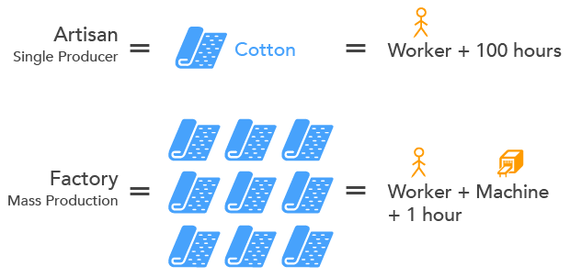There's plenty of chatter about AI and robotics, from Microsoft's chatbot framework to Industry 4.0. What's striking in these discussions is regardless of whether you fear or love AI bots, our future with them is inevitable.
Why the Bot hype?
People are excited about Bots, both physical and digital, because they are the next wave of industrial revolution.
Industrial revolutions are not defined by individual technological improvements, but changes in labor and distribution.
During the 1st and 2nd industrial revolutions, many things were invented; from looms to steam engines to new smelting iron techniques. It was an Industrial Revolution because goods were no longer produced by human hands, but could be primarily outsourced to machines and manufacturing processes.
With manufacturing, we could now make hundreds of output per day in what would usually require many months. Example: cotton fabric. What would require many skilled workers hours, could now be outsourced to a single machine.
With machinery as a capital investment, and assembly line as process, the concept of 'mass production' could now exist along with mass consumers, economies of scale, middle class -- all of which, never existed before.

In Andrew Grove's Only The Paranoid Survive, these were points of inflection that changed the way of doing business, re-organized fundamental aspects of how we lived, how we worked, how we organized and socialized.
A more recent example of inflection is the Internet. Pre-internet, sales were limited to local or regional for small business owners. There were extremely high barriers to global market entry, requiring capital and logistics networks that only large multinational companies could obtain.

Post-internet, anyone could set up a website and access to potential customers worldwide with an internet connection. Market distribution was no longer a barrier, small business owners could now sell goods worldwide.
The Bot Revolution
The reason why everyone is so crazy for AI bots is that they affect both labor AND distribution, so the order of magnitude will be enormous.
Labor
While huge strides in manufacturing were made with high-output machinery and Henry Ford's assembly line, factories still required human labor to operate. With specialized AI bots, the dream of a fully automated scalable production is achievable.
via imgur
The modern lifestyle requires cheap labor to produce cheap goods. Reality is, even as world population grows, we're running out of countries with cheap labor to manufacture goods at low costs. These developing countries are aspirational -- they want the Western consumer lifestyle of material affluence too.
That's where AI steps in. Robots could run entire factories, with each task minutely delegated and hyper specialized. Goods could be produced at near cost or below cost if AI bot manufacturing hit economies of scale.
Besides manufacturing, AI can assist in service tasks. From customer service queries to stock brokers and even creative tasks like design, bots can respond faster, never tire, generate more ideas and predict with greater accuracy.
In the future, labor might not be related to wages. Humanity could be free from paid work, and instead pursue their passions without having to work for someone else. Or the outcome might be more dystopian, with wealth and resources concentrated at the top among bot creators.
Distribution
Chat commerce is exciting because it's taking advantage of social networks as a form of distribution. It's been proven that the most effective way to promote your brand is by word-of-mouth, and nothing is more intimate than chat.
via giphy
Direct interaction with a consumer and their social network means that brands can actively design features by asking customers for feedback directly, tailor messages to niche communities to build viral loops and provide immediate customer service.
Most of all, chat is highly accessible. Compared to signing up or downloading apps for install, adding a friend is almost frictionless.
Building Ethical Bots
As our future is tied to bots, we need to think about how to build ethical bots. We've been fascinated with building versions of ourselves -- a fascination that goes beyond technology. From books to movies to mythologies, scattered in our collective history are attempts to duplicate human intelligence and bodies.
Maybe it's an extreme version of our ego, but by creating intelligent beings perhaps we're not only questioning what it means to be human, but also showing how powerful and godlike we are.
not quite omnipotent yet via imgur
Current bots are like dumb toddlers. In Tay's case, she didn't know better. An internet hate group told her these horrible racist things over and over again, and so she cluelessly parroted it right back to other users. She lacked the reasoning and "common sense" that we have to understand that it was wrong.
In order to build ethical bots, we need to teach them human values. Artificial intelligence Quixote teaches bots right and wrong human behavior by reading them stories and rewarding bots with good behavior.
However, in order to make sophisticated judgements, bots need to learn how to deal with ambiguous situations which require contemporary data points. For instance, whether it's OK to extend life support or convince patients to go through with risky surgeries.
Ethical bots have to be trained on socially diverse sets of data so that they have an unbiased viewpoint and not just representing the views of one group.
Alyx Baldwin and Rachel Law are co-founders of the artificial intelligence group shopping chatbot Kip.
